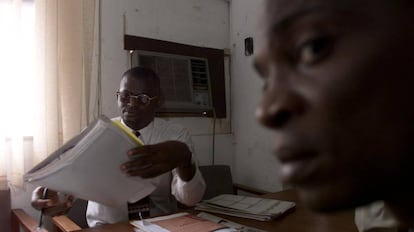When will Spain resume contributions to the Global Fund to combat AIDS?
Government spending on overseas aid depends on 2017 budget, still to be announced
Spain is six years in arrears to the Global Fund, the 50-nation organization that pays for research into HIV, AIDS, tuberculosis and malaria. Madrid stopped contributing in 2011, saying the Fund was riddled with corruption. At the organization’s September conference in Montreal, the Spanish government said that it intended to resume donations, but gave no details of the amount or when it would do so.

Any contribution would depend on the 2017 budget, which will not be announced until the first weeks of the new year. The draft budget should be presented before Congress by the end of January, which will then take around two months to approve it. Sources at Spain’s AECID overseas development agency say that it did not expect any money to be set aside in the budget for the Fund.
AECID says that while the Spanish government is not contributing to the Fund financially, it is working with the Democratic Republic of Congo, Ethiopia and Cameroon “on a number of debt cancellations in return for investment in health,” totaling some €18 million.
Between 2003 and 2010 Spain donated some €630 million to the Global Fund
In any event, Spain will have a second opportunity later in 2017 to contribute funding to priority areas that were not covered by the amount announced at the end of the September conference.
Last week in Congress, all parties, including the governing Popular Party, unanimously approved a non-binding bill calling on the government to set aside €100 million over the next three years.
The AECID described the move as “positive”, but added: “Without a negotiated budget it is hard to assess the bill, as future contributions depend on there being enough in the budget for this end.”
Between 2003 and 2010 Spain donated some €630 million to the Global Fund, becoming its biggest donor in the process. In accumulative terms, Spain is still the 12th-largest donor to the Fund, which raises some €3.5 billion a year to finance some 1,000 projects to tackle AIDS and other pandemics. At present, it is helping almost half the 18 million people with access to retroviral drugs and has saved more than 17 million lives since it was set up in 2002, according to its own figures.
English version by Nick Lyne.
Tu suscripción se está usando en otro dispositivo
¿Quieres añadir otro usuario a tu suscripción?
Si continúas leyendo en este dispositivo, no se podrá leer en el otro.
FlechaTu suscripción se está usando en otro dispositivo y solo puedes acceder a EL PAÍS desde un dispositivo a la vez.
Si quieres compartir tu cuenta, cambia tu suscripción a la modalidad Premium, así podrás añadir otro usuario. Cada uno accederá con su propia cuenta de email, lo que os permitirá personalizar vuestra experiencia en EL PAÍS.
¿Tienes una suscripción de empresa? Accede aquí para contratar más cuentas.
En el caso de no saber quién está usando tu cuenta, te recomendamos cambiar tu contraseña aquí.
Si decides continuar compartiendo tu cuenta, este mensaje se mostrará en tu dispositivo y en el de la otra persona que está usando tu cuenta de forma indefinida, afectando a tu experiencia de lectura. Puedes consultar aquí los términos y condiciones de la suscripción digital.









































